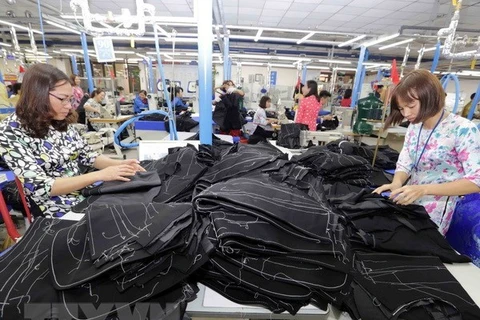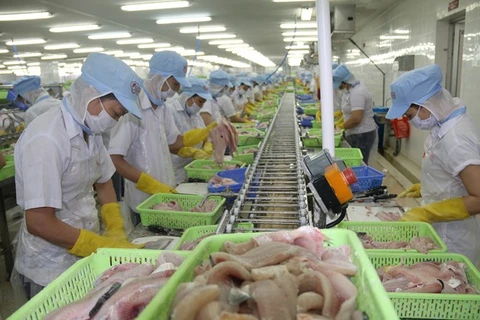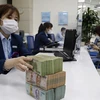Hanoi (VNA) – Although the US is deemed a promising market for exporters, it also sets very strict import regulations. For this reason, Vietnamese enterprises are urged to improve their capacity and shake hands with others to develop supply chains to make inroads into this market.
In the first half of 2018, the US continued to top Vietnam’s export markets with 21.6 billion USD as of mid-July, accounting for 19 percent of the latter’s total export revenue.
According to statistics from the Ministry of Industry and Trade, Vietnam mostly shipped seafood, textile and garments, footwear, wood and timber products, computers, electronics and parts, and agricultural products to the US. Meanwhile, Vietnam’s imports from the US included computers, electrical components, cotton, animal feed and related materials, soy beans, and machinery and equipment.
However, the US has become very tough on importers with a series of trade tactics such as anti-dumping and countervailing duties that require Vietnamese businesses to be more developed in order to gain a foothold in this market, said Tran Quoc Manh, Chairman of the Sai Gon Trade and Production Development Corporation (Sadaco).
According to Manh, wooden furniture sent to the US is one of Vietnam’s five largest foreign currency earners. The US’ orders for wooden furniture from Vietnam are considerable, with several hundred containers each month. Those looking to export to this market must be able to fulfil such large orders and produce pieces of furniture that reach a high level of finesse.
Vietnamese firms need to expand their scale and use automated production lines to satisfy these requirements, he suggested.
Other experts forecast that the US’s stricter rules on imports of seafood and agricultural products will raise costs and reduce the competitive edge of Vietnamese exporters. In the long term, to sustain access to this market, local firms must adapt themselves to such rules and strictly follow food safety regulations.
Deputy Minister of Industry and Trade Do Thang Hai warned that new changes in the US’ trade policy is likely to have major impacts on exports of many Vietnamese key items, so that it may become difficult to maintain the current shipments, let alone boost exports, to the US market.
The Ministry of Industry and Trade encourages domestic enterprises to build supply chains in order to add greater value to goods to be exported to the US, Hai said, adding that the ministry is ready to assist firms in this matter.
According to James Fatheree, head of the US Chamber of Commerce in Asia, firms from the US are turning more attention towards the Vietnamese market as it holds a number of advantages in term of demographics, high economic growth, and progress in economic reform. Notably, they highly appreciated Vietnam’s human resources development alongside its improved business climate driven by the reforms of political institutions and public administration services.
Experts proposed that the Vietnamese Government should help ease barriers for domestic businesses by cutting public administrative fees and holding trade promotion events for them.
At the same time, the Government must keep regularly updated on changes in the US’ trade policy in order to come up with proper measures to support its firms in terms of production and business strategy so as to maintain their competitive advantages in this market. Further stepping up the building of a fairer and more transparent legal system is also a must, not only to draw in more foreign investment, but also to facilitate the development of local enterprises.–VNA
In the first half of 2018, the US continued to top Vietnam’s export markets with 21.6 billion USD as of mid-July, accounting for 19 percent of the latter’s total export revenue.
According to statistics from the Ministry of Industry and Trade, Vietnam mostly shipped seafood, textile and garments, footwear, wood and timber products, computers, electronics and parts, and agricultural products to the US. Meanwhile, Vietnam’s imports from the US included computers, electrical components, cotton, animal feed and related materials, soy beans, and machinery and equipment.
However, the US has become very tough on importers with a series of trade tactics such as anti-dumping and countervailing duties that require Vietnamese businesses to be more developed in order to gain a foothold in this market, said Tran Quoc Manh, Chairman of the Sai Gon Trade and Production Development Corporation (Sadaco).
According to Manh, wooden furniture sent to the US is one of Vietnam’s five largest foreign currency earners. The US’ orders for wooden furniture from Vietnam are considerable, with several hundred containers each month. Those looking to export to this market must be able to fulfil such large orders and produce pieces of furniture that reach a high level of finesse.
Vietnamese firms need to expand their scale and use automated production lines to satisfy these requirements, he suggested.
Other experts forecast that the US’s stricter rules on imports of seafood and agricultural products will raise costs and reduce the competitive edge of Vietnamese exporters. In the long term, to sustain access to this market, local firms must adapt themselves to such rules and strictly follow food safety regulations.
Deputy Minister of Industry and Trade Do Thang Hai warned that new changes in the US’ trade policy is likely to have major impacts on exports of many Vietnamese key items, so that it may become difficult to maintain the current shipments, let alone boost exports, to the US market.
The Ministry of Industry and Trade encourages domestic enterprises to build supply chains in order to add greater value to goods to be exported to the US, Hai said, adding that the ministry is ready to assist firms in this matter.
According to James Fatheree, head of the US Chamber of Commerce in Asia, firms from the US are turning more attention towards the Vietnamese market as it holds a number of advantages in term of demographics, high economic growth, and progress in economic reform. Notably, they highly appreciated Vietnam’s human resources development alongside its improved business climate driven by the reforms of political institutions and public administration services.
Experts proposed that the Vietnamese Government should help ease barriers for domestic businesses by cutting public administrative fees and holding trade promotion events for them.
At the same time, the Government must keep regularly updated on changes in the US’ trade policy in order to come up with proper measures to support its firms in terms of production and business strategy so as to maintain their competitive advantages in this market. Further stepping up the building of a fairer and more transparent legal system is also a must, not only to draw in more foreign investment, but also to facilitate the development of local enterprises.–VNA
VNA

























